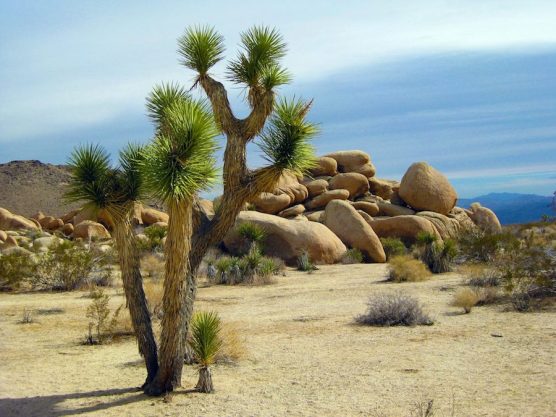By Matthew Renda
(CN) — The California Department of Fish and Wildlife recommended against adding the iconic Joshua tree to the state endangered species list, angering environmentalists who say a lack of protections will further imperil the vulnerable trees.
The state Fish and Game Commission decided last year to grant temporary protections to the Joshua Tree due to the ravages of climate change, following a summary memo by state Fish and Wildlife finding there is “sufficient scientific information available to indicate that the petitioned action may be warranted and recommends that the petition be accepted and considered.” The finding came in response to a request by environmentalists to protect the species after the Trump administration refused.
But Wednesday’s report by the same agency said that climate change’s impact will come decades from now and may not be that bad should the tree show an ability to adapt to changing conditions.
“Western Joshua tree is currently abundant and widespread, which lessens the overall relative impact of the threats to the species, and substantially lowers the threat of extinction within the foreseeable future,” the report states.
The report will be considered by Fish and Game in June, when commissioners will decide whether to extend the temporary protections or withdraw them.
Environmentalists lambasted the conclusions of the report and said withdrawing any protections will only further endanger the iconic species.
“California wildlife officials just proposed open season on Joshua trees,” said Brendan Cummings with the Center for Biological Diversity. “Before state protections took effect, developers were bulldozing these beautiful, fragile trees by the thousands to build roads, warehouses, power plants, strip malls and vacation rentals. If Joshua trees are to have any hope of surviving in a warming world, we have to stop the widespread killing of them.”
The temporary protections in place at present prevent the taking of Joshua trees without specific permits.
Business groups unsuccessfully sued state Fish and Wildlife — U.S. Fish and Wildlife Department makes decisions regarding the listing of species on the federal Endangered Species List — but such groups say development, expansion and other economic activity are constrained in the area of California where Joshua trees flourish.
Joshua trees are mostly restricted to the Mojave Desert, but thrive in the Lost Horse Valley of Joshua Tree National Park. They can also be found in Utah, Nevada, Arizona and the high deserts of northwestern Mexico.
A study published in 2019 used climate modeling to analyze the future distribution of the Joshua tree and concluded that if temperatures keep increasing, Joshua Tree National Park will grow too hot to support the iconic tree.
Scientists said their models “project a severe decline in the area of suitable climates for Joshua tree by 2070 to 2099, perhaps to as little as 10% of its current range, as the southern parts of its range become climatically unsuitable.”
But biologists with state Fish and Wildlife said the agency lacks concrete data that indicates the trees are in immediate danger of extinction due to climate change.
“While the department recognizes the threats faced by the species, and the evidence presented in favor of the petitioned action, the scientific evidence that is currently possessed by the department does not demonstrate that populations of the species are negatively trending in a way that would lead the department to believe that the species is likely to be in serious danger of becoming extinct throughout all or a significant portion of its range in the foreseeable future,” the report states.
The biologists also say the threats to Joshua trees due to development and habitat encroachment are overblown due to the large number of trees that proliferate inside protected places like the national park.
“Many populations within the range of the species are protected from development, suggesting that a significant portion of the species’ range will not be lost by development alone,” the report states, also saying that wildfire threats hurt individual trees but do not threaten a loss of range.
But environmentalists disagree. They note that 40% of Joshua trees subsist on private lands and point to the Dome Fire of 2020, where nearly all the Joshua trees in a portion of the Mojave Desert Natural Preserve in Arizona perished.
“The department’s recommendation is scientifically and legally flawed and reflects an agency either unwilling or unable to rise to the challenge that climate change presents to California’s natural heritage,” Cummings said. “Fortunately, the commission has the final say on whether Joshua trees maintain the legal protection they’re entitled to and so desperately need.”
Like this:
Like Loading...
Related





 Tweet This
Tweet This Facebook
Facebook Digg This
Digg This Bookmark
Bookmark Stumble
Stumble RSS
RSS


























REAL NAMES ONLY: All posters must use their real individual or business name. This applies equally to Twitter account holders who use a nickname.
0 Comments
You can be the first one to leave a comment.